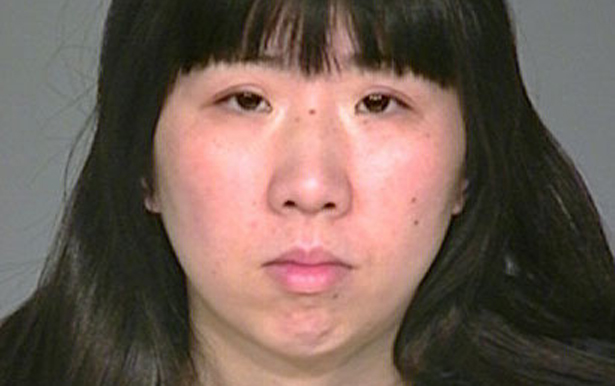
Bei Bei Shuai. (AP Photo/Indianapolis Metropolitan Police Department)
On March 14, Bei Bei Shuai will have spent one full year in jail in Marion County, Indiana. Her crime? The prosecutor calls it attempted feticide and murder. What it really is: attempting suicide while pregnant.
In December 2010 Shuai was running a Chinese restaurant in Indianapolis with her boyfriend, Zhiliang Guan, by whom she was eight months pregnant. Just before Christmas, he informed her that he was married and had another family, to which he was returning. When Shuai begged him to stay, he threw money at her and left her weeping on her knees in a parking lot. Despairing, she took rat poison and wrote a letter in Mandarin saying she was killing herself and would “take this baby with me to Hades”; friends got her to the hospital just in time to save her life. Eight days later her baby, Angel, was delivered by Caesarean section and died of a cerebral hemorrhage within four days. Three months later, the newly elected prosecutor, Terry Curry—a Democrat—brought charges, claiming that the rat poison that almost killed Shuai had killed her baby. If convicted, she faces forty-five to sixty-five years in prison.
It is hard to know where to begin listing what’s wrong with this case. Consider the health ramifications: attempting suicide is not a crime in Indiana. It’s the tragic result of mental illness, depression and extreme emotional distress; and it’s not uncommon for pregnant women to seriously consider it, or even try it. According to a 2010 study in Obstetrics & Gynecology, suicide is the fifth leading cause of death among pregnant women. Pregnant women in crisis need and deserve compassion and treatment. But if Shuai is convicted, what pregnant woman will seek help? “Every major medical and public health organization that has considered the issue has concluded that it is dangerous for maternal and fetal health to hold women criminally liable for their pregnancy outcomes,” says Emma Ketteringham, director of legal advocacy for National Advocates for Pregnant Women (NAPW), which is co-counsel to Shuai’s defense. Eighty such groups and experts—including the National Perinatal Association, the National Alliance on Mental Illness, the American College of Obstetricians and Gynecologists, and the American Nurses Association—have filed amicus briefs.
Unfortunately, punishing women for their behavior during pregnancy is becoming more and more common, fueled by the passage of “unborn victims of violence” laws in at least thirty-eight states declaring the fetus (or, in twenty of those states, even the embryo or fertilized egg) a separate victim in cases of homicide. In most instances these laws were intended to protect pregnant women from violence, especially from abusive partners, not to apply to the women themselves. But that is what has happened, as the antiabortion forces have gained power. “The prosecution’s legal arguments are exactly based on legal arguments behind the personhood measures now moving through the states,” Lynn Paltrow, executive director of NAPW, told me by phone. “They treat the fetus as completely separate within the pregnant woman. How can you be separate and within?”
Pro-choicers have focused on the dangers fetal personhood measures present to abortion rights. That danger is real: they’re part of the antiabortion strategy to build up the legal status of the fetus as a person in so many parts of the law that when the Supreme Court finally revisits Roe v. Wade, a woman’s right to terminate her pregnancy will look like a bizarre exception. But these laws pose broader dangers to women, because they hold pregnant women liable for any conduct during pregnancy that a local prosecutor suspects caused a bad outcome—and bear in mind that every year 15-20 percent of pregnancies end in miscarriage, 1 percent end in stillbirth and another 19,000 end in neonatal death. Under these laws, hundreds of pregnant women have been arrested, often on only tenuous evidence that their actions, including drug use, harmed their fetuses. In Alabama sixty women have faced such charges.
“These laws say there’s one law for pregnant women and another for everyone else,” says Linda Pence, the energetic Indiana lawyer representing Shuai. “For everyone else suicide is a mental health issue. For a pregnant woman, it’s a crime. That’s a violation of women’s constitutional right to equal treatment under the law.” If Shuai is convicted, Pence notes a further paradox: “If you’re two months pregnant and try to commit suicide, you can be charged with feticide, even though you could have a legal abortion.” Although maybe not for long.
In its briefs the state portrays Shuai as a heartless and calculating home wrecker who lived with a married man and “committed a cold-blooded and intentional act that ended the life of her unborn child” in order to punish him when he left. But who is really being cold-blooded here? The woman who tried to kill herself, who held her baby for five hours as her life slipped away and wept inconsolably when she died? and who then went into a psych unit? Or the prosecution who thinks pregnant women are legally required to stay sane until they give birth?
In February Shuai was granted bail on appeal—something, says Pence, no defendant in a murder case in Indiana has won in more than a hundred years. The bad news is that the court of appeals refused to dismiss the case. For now, Shuai remains in jail. I asked Curry if those eighty expert amicus briefs gave him pause. “I’m the prosecuting attorney,” he replied. “We don’t make the law. We enforce the law.”
How you can help: keep up with the case on Twitter @FreeBeiBei; “like” Free Bei Bei Shuai on Facebook; donate to NAPW at advocatesforpregnantwomen.org or by check to NAPW, 15 West 36 Street, #901, New York, NY 10018; write to Bei Bei in care of NAPW. You can also sign the petition to free Bei Bei Shuai.


